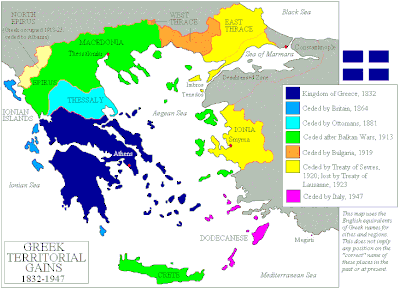Treaty of Constantinople (1832)
This article has multiple issues. Please help improve it or discuss these issues on the talk page. (Learn how and when to remove these template messages)
|

The Great Powers ratified the terms of the Constantinople Arrangement in connection with the border between Greece and the Ottoman Empire in the London Protocol of 30 August 1832, which marked the end of the Greek War of Independence and established modern Greece as an independent state free of the Ottoman Empire. The Treaty of Constantinople was the product of the London Conference of 1832 which opened in February 1832 with the participation of the Great Powers (Britain, France and Russia) on the one hand and the Ottoman Empire on the other. The factors which shaped the treaty included the refusal of Leopold of Saxe-Coburg-Gotha to assume the Greek throne. He was not at all satisfied with the Aspropotamos–Spercheios line, which replaced the more favorable Arta–Volos line considered by the Great Powers earlier.[1]
The withdrawal of Leopold as a candidate for the throne of Greece, and the
Under the protocol signed on 7 May 1832 between Bavaria and the protecting Powers, and basically dealing with the way in which the Regency was to be managed until Otto reached his majority (while also concluding the second Greek loan, for a sum of £2,400,000 sterling), Greece was defined as an independent kingdom, with the Arta-Volos line as its northern frontier. The Ottoman Empire was indemnified in the sum of 40,000,000 piastres for the loss of the territory. The borders of the Kingdom were reiterated in the London Protocol of 30 August 1832 signed by the Great Powers, which ratified the terms of the Constantinople Arrangement in connection with the border between Greece and the Ottoman Empire and marked the end of the Greek War of Independence creating modern Greece as an independent state free of the Ottoman Empire.
See also
- London Protocol (1832)
- List of treaties
- Treaty of Sèvres
- Treaty of Lausanne
References
- ^ Konstantopoulou Photeine, The foundation of the modern Greek state: Major treaties and conventions, 1830-1947 (1999) p 35.
Sources
- Treaty of Constantinople Archived 11 August 2003 at the Wayback Machine
Further reading
- Anderson, M.S. The Eastern Question, 1774-1923: A Study in International Relations (1966) online
